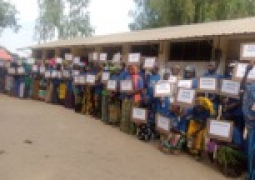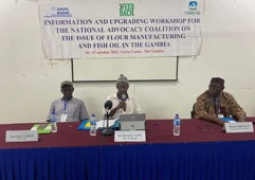Minister Claudiana A. Cole and the UNICEF rep Ms Nafisa Binte Shafique made the clarion call for action in a joint statement that was released on the occasion of the International Day of Education, which is commemorated annually on the 24th of January as adopted by the United Nations General Assembly on 3 December 2018.
The duo calls “on all partners, especially parents, the private sector and development partners, to make it an urgent priority to ensure every child is in school at the right age, and to invest more in the education and skills of children”.
They state: “While primary school enrolment was at 428,053 children in 2023, more than 46,000 children in the country are still out of school and face a potentially challenging future if they grow up without appropriate education or skills. Children miss out on so many crucial opportunities when they are denied the right to education, a basic right that no child should have to struggle for.
“With many children not able to experience the full cycle of schooling – primary school completion rate is at 88 percent, upper basic school 65 percent and senior secondary school 47 percent – we must work stronger together to support children to enroll, stay in school and learn.”
Considering these somewhat worrying figures, the top officials deem it more necessary than ever to support national efforts to ensure quality education.
They contend that this could be achieved by building more disability-accessible schools with the right facilities and resources for learning, empowering and motivating teachers to deliver quality lessons, and supporting families in difficult circumstances to cover the associated costs of education and other basic needs that hinder their children’s education.
Nonetheless, the top officials also recognise and acknowledge the significant strides attained in the nation’s education domain, which has massively bolstered, with most children now having access to a primary school within two kilometers of their homes.
According to the bodies, this stands as a concrete testament to The Gambia’s commitment to fulfilling the fundamental right of every child to education as guaranteed by the Constitution and the Convention on the Rights of the Child (CRC).
However, while highlighting the unswerving commitment of government and the current efforts being wielded, the duo acknowledges the vacuum that persists. Thus, they once again urge a collective effort to address the learning crisis, such as investment in foundational learning.
They conclude: “The Ministry of Basic and Secondary Education and UNICEF will continue to actively work together, through the Zero Out-Of-School Children project that is funded by the Education Above All Foundation and other initiatives, to ensure children in The Gambia have equal opportunities to enroll in school and learn until they complete their education.”
Read Other Articles In Headlines
NPP celebrates by-election victories in Kaiaf, Bantanjang
Jan 12, 2026, 12:15 PM




